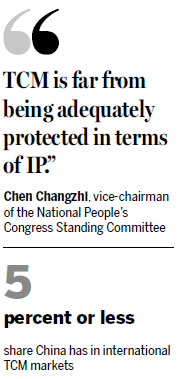NPC: TCM requires greater protection
China should put greater focus on the intellectual property protection of traditional Chinese medicine to guarantee better development, said Chen Changzhi, vice-chairman of the National People's Congress Standing Committee, at a recent conference held for the review of the related draft law.
"TCM is far from being adequately protected in terms of IP, for we still have many weak points in such aspects as patents, trademarks, technical know-how and business secrets," Science and Technology Daily quoted Chen as saying.
The National People's Congress, the top legislature in the country, held its bimonthly session in Beijing from Aug 29 to Sept 3, reading and discussing draft laws on TCM, national defense, transportation and the movie industry.
About 10 days earlier, President Xi Jinping also stressed at a two-day national meeting on health the role of TCM in promoting people's health, underlining the importance of innovation, and the coordinated and complementary development of TCM and Western medicine.

However, China's TCM sector is facing a developmental predicament. A large number of valuable prescriptions were lost and trademarks have also been preemptively registered by overseas trademark squatters.
In addition, statistics from Japan's Daiwa Institute of Research Group show that China holds less than a 5 percent share in international TCM markets, while Japan holds an estimated 80 percent market share.
Li Andong, member of the NPC Standing Committee, said at the session that the lack of IP controls and awareness in the TCM sector has seriously hampered its innovation and progress. Li called for more official encouragement and support for the application of IP rights for innovative TCM achievements.
Participants also proposed to further protect traditional TCM knowledge through databases and catalogs, and establish a multilevel personnel training system to promote stewardship.
Other topics discussed included construction of a management system, TCM medical licensing examination and quality supervision on TCM materials.
So far, there is no clear standard for the kind of medicinal materials that are qualified, which has led to problems like the abuse of pesticides and chemical fertilizers, and excessive heavy metal content in those medicinal materials, said You Hongtao, president of Chongqing Pharscin Pharmaceutical Co, China Radio International reported on its website.
The draft, which has finished its second reading, stresses stricter management of farms used for herb cultivation, as well as better environmental protection for herb-growing regions and enhanced safety during processing.
In addition, research on projects crucial to TCM's development, such as prevention and treatment of major diseases, should be strengthened.
The initial draft was first read in December 2015.

(China Daily 09/07/2016 page17)


















